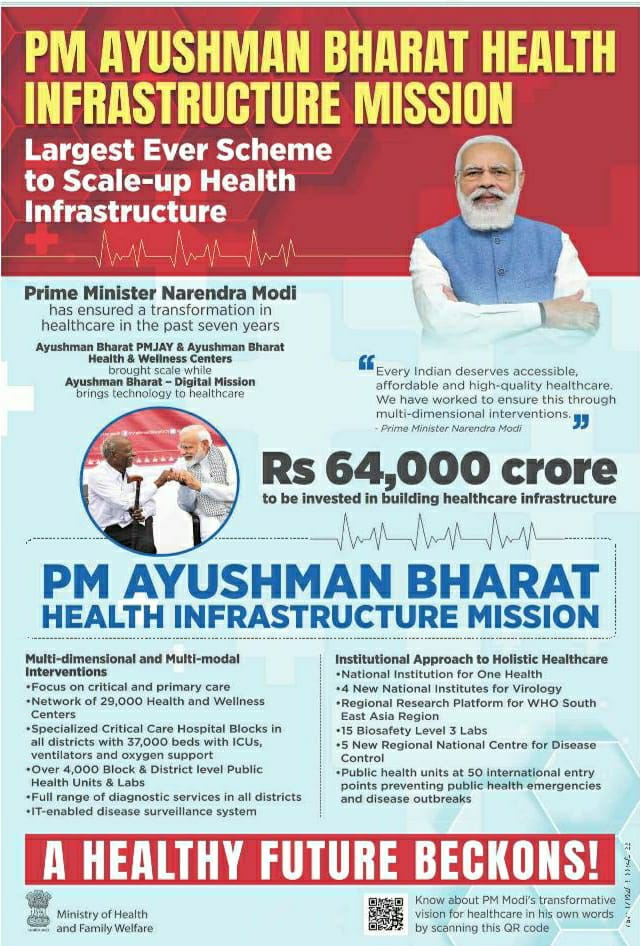PM Ayushman Bharat Health Infrastructure Mission

PM Shri Narendra Modi ji has given us the vision of comprehensive healthcare under the ‘From Token to Total’ approach: Dr Mansukh Mandaviya
“We are working with a ‘Saturation Approach’ with the Block, District, State and National levels seamlessly connected for affordable and quality healthcare”
“Swastha Desh Samruddh Desh: only a healthy nation can be a productive nation”
“The umbrella pan-India Ayushman Bharat providing primary, secondary, tertiary, digital and resilient healthcare systems”
“India the first country in Asia to have two container-based hospitals”
“Prime Minister Shri Narendra Modi ji has given us the vision of comprehensive healthcare under the ‘From Token to Total’ approach. We are working with a ‘Saturation Approach’ with the Block, District, State and National levels seamlessly connected for affordable and quality healthcare”. This was stated by the Union Minister of Health & Family Welfare Dr Mansukh Mandaviya as he addressed a media conference on PM Ayushman Bharat Health Infrastructure Mission launched by the Prime Minister yesterday at Varanasi, Uttar Pradesh. Union Minister of State for Health and Family Welfare, Dr. Bharati Pravin Pawar was also present on the occasion.
With an outlay of ₹64,180 crore, PM Ayushman Bharat Health Infrastructure Mission, announced in the Budget 2021-22, is the largest pan-India Health Infrastructure Scheme that aims to provide a much-needed fillip to India’s capacity to address emergent Public Health issues. This will bring about a paradigm shift in India’s healthcare infrastructure and make it more resilient.
Emphasizing how development and health are interlinked, he stated that “for any country to achieve prosperity, it has to first become healthy”. Towards achieving this objective, he outlined Prime Minister Shri Narendra Modi’s vision which led to schemes like Swachh Bharat Abhiyan, Fit India, Khelo India and Yoga which are necessary for preventive health and addresses the issues holistically. The Union Health Minister added that “only a healthy nation can be a productive nation- Swastha Desh, Samruddh Desh. The umbrella pan-India Ayushman Bharat will provide primary, secondary, tertiary, digital and resilient healthcare systems that will equip the country to face challenges of pandemics in the future. The Ayushman Bharat- Health & Wellness Centres was launched in April 2018 followed by Ayushman Bharat-PMJAY in September 2018. The Ayushman Bharat Digital Mission was launched this year in September, while the pan-India health infrastructure strengthening scheme- PM Ayushman Bharat Health Infrastructure Mission- was launched yesterday. These initiatives shall provide affordable, quality and accessible healthcare to all people, he added. They will also enable citizens for universal access to basic diagnostic and treatment services and will take care closer to communities in both rural and urban areas. “The poorest person is today getting the same quality healthcare as others in premier hospitals through Ayushman Bharat-PMJAY”, he said.
Speaking of the intense efforts undertaken by the Union Health Ministry in this regard, Dr. Mandaviya informed that in order to ensure better primary healthcare facilities, 1,50,000 Ayushman Bharat Health and Wellness Centres are in line to be set up, of which around 79,000 are already functioning. In addition, work has started on ensuring that every district has at least one medical college with the government already sanctioning 157 medical colleges. “This will also build a trained frontline health workforce to respond to any public health emergency”, the Union Health Minister added. He stated that the decision to expand the AIIMS network to 22 hospitals from the existing strength of 7 was also borne from the Prime Minister’s vision of safe, comprehensive, affordable and accessible healthcare for all.
Speaking on India’s strategy of turning the crisis into opportunity, Dr. Mandaviya said, “COVID-19 has provided us with an opportunity to boost healthcare facilities including laboratories, hospitals and diagnostic facilities at all the levels of healthcare”.
Highlighting some of the key features of PM Ayushman Bharat Health Infrastructure Mission, the Union health Minister stated that 134 different types of tests will be done for free at the district level which will not only save costs but also reduce unnecessary inconvenience for poor people. Secondly, for the first time in Asia, two container-based hospitals with comprehensive medical facilities will be kept ready at all times which can be swiftly mobilized by rail or air to respond to any calamity or disaster in the country.
PM Ayushman Bharat Health Infrastructure Mission aims to produce robust outcomes in Public Health leapfrogging India to one of the most advanced countries in the world in terms of management of Public Health outbreaks. The components, such as setting up of the National Platform for One Health, setting up a Division for Research on Disease Elimination Sciences & Health as a Satellite Centre of National Aids Research Institute, setting up of the Regional NIVs, strengthening of existing National Research Institutions, the NCDC and existing laboratory infrastructure, upgradation of labs and creation of additional BSL-3 facilities under the ICMR and the NCDC, will further strengthen the country capacity to detect & diagnose new infections.
The planned interventions will also lead to availability of adequately trained manpower who can contribute to diagnosis and research on novel pathogens and biological threats, reducing dependence on foreign partners and laboratories.
Development of Critical Care Hospital Blocks in 602 districts as proposed under the scheme, shall make such districts self-sufficient, to a large extent, in providing comprehensive treatment for infectious diseases without disruption to the other essential health services and also augment the critical care capacities in the public health facilities.
Initiatives such as strengthening of Points of Entry will ring fence our borders against the import of new infectious diseases and pathogens. Health Emergency Operation Centres and the container based mobile hospitals shall further build capacities for effective emergency response during such times.
Setting up of the national, regional, state, district and block level laboratories integrated into a network for surveillance functions, backed by a robust I.T. based reporting mechanism through the Integrated Health Information Platform (IHIP), shall lead to self-reliance for detection, prevention and containment of disease outbreaks.

